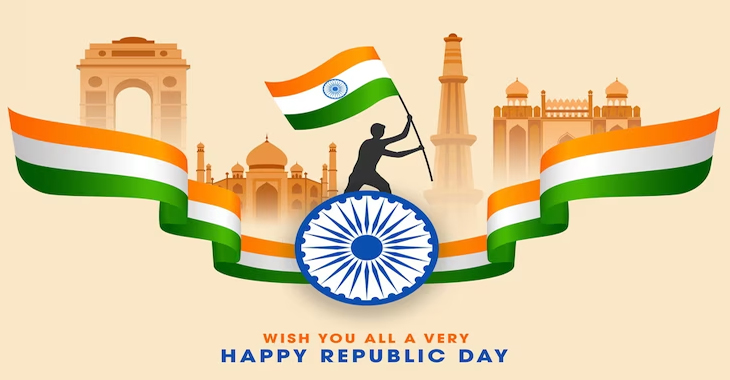Today, January 26, 2024, is India’s 75th Republic Day. Emmanuel Macron, the president of France, is the main guest this year. Around 10 in the morning, at Kartavya Path, President Droupadi Murmu hoisted the national flag. The themes of Republic Day this year are “Loktatantra ki Matruka” and “Viksit Bharat.”
On Friday, Prime Minister Narendra Modi carried on his custom of dressing in bright, flashy turbans on Republic and Independence Days. The prime minister is wearing a multicolored bandhani print safa “pagdi” (turban) for the 75th Republic Day ceremonies.
Republic Day is observed to honor the passage of the Indian Constitution, which became operative on January 26, 1950. After India gained independence from the British Raj in 1947, the Government of India Act 1935 was superseded by the constitution, which made the country a republic instead of a dominion. The Indian Constituent Assembly ratified the constitution on November 26, 1949, and it went into force on January 26, 1950. The date was selected because, on this day in 1930, the Indian National Congress declared Purna Swaraj, or total independence.
Republic Day is frequently linked to parades, political speeches, ceremonies, and cultural activities in addition to other celebrations of India’s heritage, history, and governance.
A motion was tabled on August 29, 1947, to establish a Drafting Committee tasked with creating a permanent constitution. The group worked on a draft constitution, which was presented to the Constituent Assembly on November 4, 1947.Before adopting the Constitution, the Assembly convened for 166 days in open sessions over a period of two years, 11 months, and 17 days. After much thought and some revisions, the 308 members of the Assembly signed two handwritten versions of the text (one in Hindi and one in English) on January 24, 1950. On January 26, 1950, two days later, it became a national policy.
Known as the founding father of the Indian constitution is Dr. Bhimrao Ambedkar. A Drafting Committee was established by the Constituent Assembly on August 29, 1947. Ambedkar served as this Drafting Committee’s chairman. Everyone is aware that Dr. B. R. Ambedkar, also referred to as Babasaheb Ambedkar, was a key architect of the Indian Constitution. Known for his political leadership, he was also a highly respected jurist, Buddhist activist, philosopher, anthropologist, historian, writer, economist, orator, scholar, and editor.
Born in Mhow, India, on April 14, 1891, Bhimrao Ramji Ambedkar passed away in New Delhi on December 6, 1956. He was the previous leader of the Dalits, also known as untouchables, and the law minister for the Indian government from 1947 to 1951.
India celebrates Republic Day with immense pride and enthusiasm. It’s a day to honor India’s independence constitution. It is customary for colleges and schools to display the national flag. There are cultural events all around the country that support India’s freedom cause. The President of India hoists the national flag at India Gate in New Delhi.
We honor the visionaries who dedicated their lives to writing a Constitution that would serve as the foundation for a pluralistic and diverse country on this day. The Republic Day celebration is more than just a remembrance; it’s a declaration of the people’s authority and a focus on their shared responsibility for determining the future of the country.
Read More
Netaji Subhas Chandra Bose Jayanti 2024: Everything You Ought To Know
Ram Temple inauguration: Pran Pratishtha completed, dream realized


